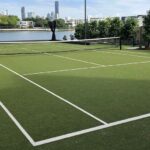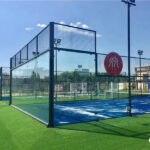Woman sunbathing on the poolside terrace.
The hardscape area around a pool is called a wraparound deck, and although it’s not always made of wood or composite materials, like traditional outdoor decks, we often associate these decks with words. Traditionally, most above-ground pool decks are made of concrete. Other materials, such as pavers and brick, are also popular choices.
Pool decks and paving in courtyards such as paths, yards, or steps are functional landscape elements that increase usable space, create a smooth transition from one area to another, provide drainage and cover exposed dirt.
The deck creates a frame as it approaches or surrounds a pool or spa while providing a safe path around its edge. If backyard space allows, the deck can be enlarged to accommodate poolside furniture for relaxing or dining.
Deck materials: what to think
Choosing a deck material shouldn’t just relate to what you find most attractive. Important things to consider:
The material must be safe and not slippery when wet.
Make sure the trim material is not rough, bumpy, or uneven.
Choose a heat-reflective material to keep the surface cooler on hot days – think barefoot!
Choose a material that mixes well with other paved or hardened areas in your yard.
If possible, find out if the material is resistant to algae, chemicals, acids, mold and mildew, and frost.
A modern solution: For a seamless look, implement the coping materials to the surrounding deck or patio.
Safety fencing and barriers should be considered and integrated into pool and deck designs. Check city or local laws or guidelines on pool barriers – most should be at least 4 feet tall and located between the pool and access area.
Take a look at the various pool deck materials, and their pros and cons.
Poolside Courtyard: Concrete
Modern house with swimming pool
A modern house in the desert surrounded by a concrete pool. Paul Bradbury/Getty Images
Concrete offers smooth surrounds in a variety of colors, in addition to the familiar light gray. Certain types of architecture, such as mid-century modern and contemporary, call for clean, simple lines and even concrete surfaces. Pool decks or fences made of concrete should be poured by a professional unless you are a professional do-it-yourselfer or a competent helper who provides a lot of help.
Pros: Very easy to maintain, feels great underfoot. It doesn’t get too hot when the temperature rises.
Cons: Concrete can become slippery when wet if it doesn’t have a textured surface or has been brushed. Aggregate (pebbles or rocks) can be added to concrete to create a non-slip surface.
Courtyard near the pool: brick
Advantages: Durable, easy to maintain, colors other than terracotta gray are available, for example.
Cons: Moss tends to grow on cool bricks, so you’ll have to maintain it regularly. Otherwise, mossy bricks can become slippery when wet and can create dangerous drop areas.
Pool Decks and Yards: Pavers
Swimming pool with pavers
The pool at dusk with interlocking pavers. George Gutenberg/Getty Images
Pavers are a popular type for paths and patios and are available in many different materials, sizes, shapes, and colors. Pavers materials for poolside patios include stone, concrete, and aggregate.
The increasingly popular interlocking concrete pavers are a great alternative to regular concrete and are designed to resemble cobblestone, granite, tile, or traditional brick. Be aware that when using interlocking pavers for pool decoration, the pattern formed by many small units can appear hectic. Before buying, take a step back and evaluate the entire space as well as the colors, textures, and patterns.
Pros: Easy to find and easy to replace if the paver is damaged. A good, budget-conscious option. Many manufacturers claim that interlocking pavers are freeze-proof if installed correctly.
Cons: When installed, a permanent border or frame is required to prevent shifting. Concrete pavers can look industrial or commercial, which is not necessarily a negative if your home and yard are modern.
wooden pool deck
Couples enjoying the view from their pool deck.
A deck built out of wood looks very attractive next to an in-ground pool or spa.
Pros: There are many varieties of wood available, depending on your budget. Design options are open, with many patterns and look possible. Because wood is a natural material, it will look natural.
Cons: Wooden decks require seasonal maintenance everywhere, including cleaning, sanding, and sealing. Maintenance is especially important due to its proximity to bodies of water. You never want it to get to the point where it splits; can you imagine sitting on the edge of a pool and having shards in your lap? Ouch!
Poolside Courtyard: Stone
Slate patio
Slate courtyard near swimming pool.
Stone is a natural material used for patios and paths, with enough texture to make it slip-resistant and enhance the landscape and architectural features. Many types are available, and prices usually depend on what’s available in your area. The price of stone from the local quarry will be lower than the price of stone from all over the country. Flat stones are used for paving; known as flagstones, they usually consist of:
Quartzite
sandstone
limestone
granite
porphyry
Advantages: Available in a variety of shapes and sizes: square, rectangular, triangular, and irregular.
Cons: Can be expensive if you choose slate that is not readily available in your area. Darker colors or shades will get hotter than lighter colors. Inexpensive stone may actually be artificial stone and it may appear cheap or fake.
Poolside Courtyard: artificial turf
Artificial turf near the pool
Artificial turf pool.
If you like a well-manicured lawn, but live in a drought-affected area, synthetic grass may be the best material for your poolside.
Pros: No pruning involved since it’s not true and doesn’t grow. It also doesn’t get brown or dry like the real thing.
Cons: Some artificial turf filler is made from recycled rubber tires, while fake grass is usually made from petroleum-based products. Check the “ingredients” used to create fake grass. Another downside – some compositions can get hot, especially when exposed to the sun. Unlike real grass, fake turf is not biodegradable. If it gets dirty with dripping popsicles or shit, it still needs cleaning.
Click on poolside artificial grass to find more interesting details.
Poolside Courtyard: synthetic decoration
Synthetic Pool Deck
Synthetic deck around the infinity pool.
Synthetic or composite trim is a popular alternative to wood without maintenance and weathering issues.
Pros: Synthetic material is durable and can last a long time. They are also resistant to insects and harsh weather conditions.
Cons: Some brands can be slippery and are not resistant to mold and mildew.





